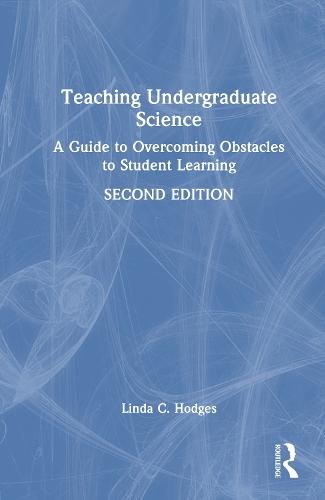Overview
Teaching Undergraduate Science: A Guide to Overcoming Obstacles to Student Learning offers college and university instructors evidence-based strategies to help students learn those specific skills and habits of mind necessary for succeeding in STEM fields. Updated and expanded from the first edition, this text elaborates on critical factors in cultivating student success, including how to engender a sense of belonging and agency in STEM, engage students in their learning, and foster deliberate practice. Hodges provides frank guidance on the relative effort and outcomes for each strategy, allowing instructors to choose techniques best suited to their aims and contexts. While focusing primarily on face-to-face classes, this resource also addresses how to work between online resources and physical spaces. Hodges’ years of experience working as and with STEM faculty provides a personal connection to the research shared, producing an accessible, practical, and enjoyable read.
Full Product Details
Author: Linda C. Hodges
Publisher: Taylor & Francis Ltd
Imprint: Routledge
Edition: 2nd edition
ISBN: 9781032819655
ISBN 10: 1032819650
Pages: 238
Publication Date: 25 September 2025
Audience:
College/higher education
,
Professional and scholarly
,
Tertiary & Higher Education
,
Professional & Vocational
Format: Hardback
Publisher's Status: Forthcoming
Availability: Not yet available

This item is yet to be released. You can pre-order this item and we will dispatch it to you upon its release.
Reviews
Linda Hodges makes buzz words and new approaches to teaching understandable. Terms like Imposter Phenomenon, Growth Mindset, and Backward Design are clearly explained. This is a thoroughly researched and data-supported discussion of what is known about learning and how to implement new approaches. This book is a must read for all teachers! Diane M. Bunce, Professor Emerita, Chemistry, The Catholic University of America, USA One of the most beautiful things about teaching is the opportunity to be a steward in the comprehensive development of students as whole people. Dr. Hodges brilliantly details ways to do this in the science classroom that both reflects what the research has helped us understand and provides a path for continuous professional improvement. Bryan Dewsbury, Associate Professor of Biology, Florida International University, USA Dr. Hodges expertly translates science education research into practical guidance for college instructors. This updated edition highlights the critical role of student belonging in learning, offering evidence-based strategies to foster inclusive classrooms. A must-read for educators seeking to create more supportive and effective science learning environments. Charles Henderson, Distinguished Professor of Physics and Science Education, Western Michigan University, USA This book is easy-to-read and full of excellent, well-researched and documented advice for teaching science to undergraduates. Novices and experts alike will learn new strategies to engage their students meaningfully and feel prepared to guide students through the challenges of authentically learning science. Jennifer Knight, Professor, Molecular, Cellular, and Developmental Biology, University of Colorado Boulder, USA This comprehensive guide addresses the unique demands and dilemmas facing instructors in STEM disciplines, grounded in the latest learning sciences research. Readers will come away with ideas they can use to engage students in even the most challenging course concepts. Michelle Miller, Professor, Psychological Sciences, Northern Arizona University, USA
Author Information
Linda C. Hodges is Emerita Director of the Faculty Development Center, University of Maryland, Baltimore County, USA; past Director of the McGraw Center for Teaching and Learning at Princeton University, USA; and a former tenured chemistry professor. She publishes widely on research in teaching and learning.



